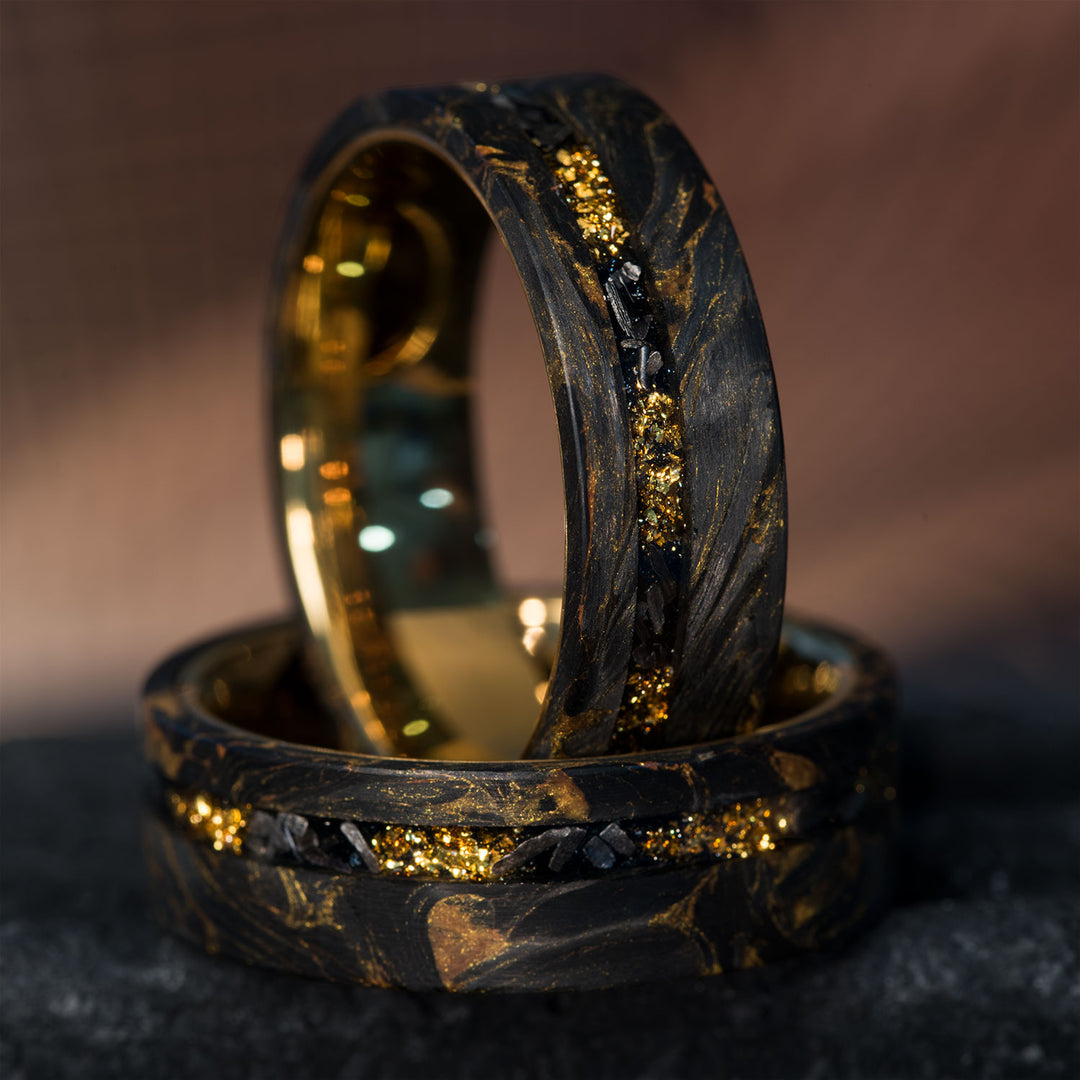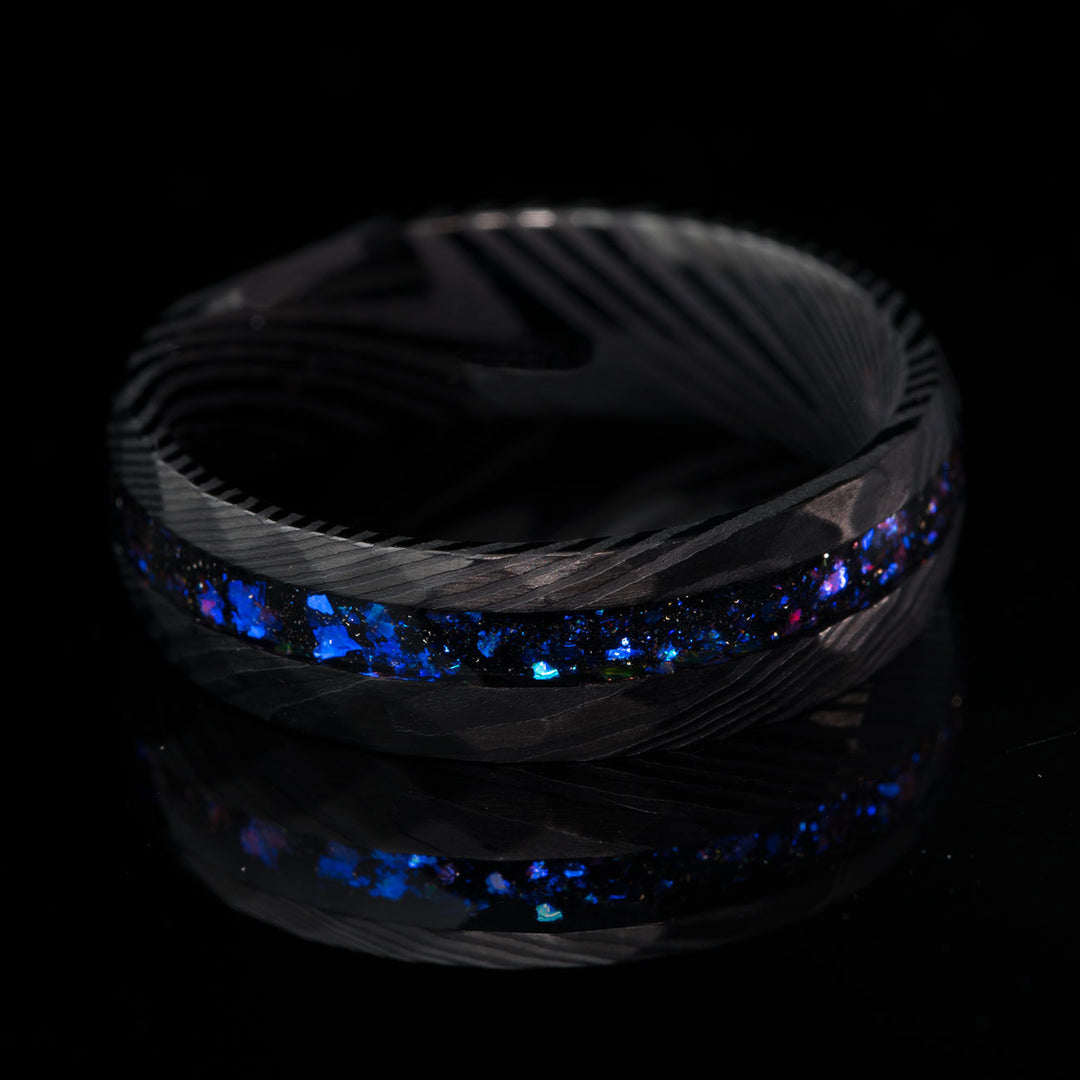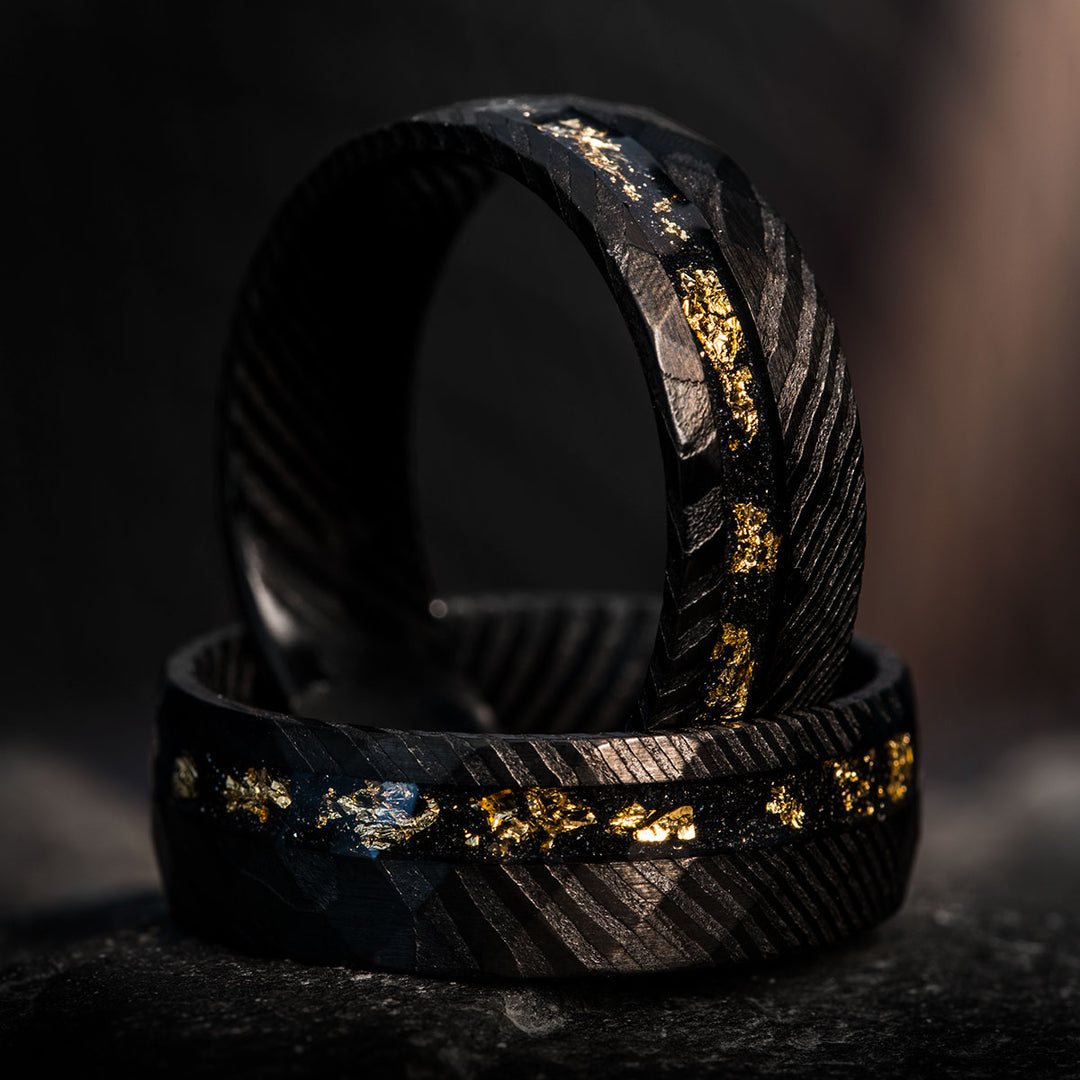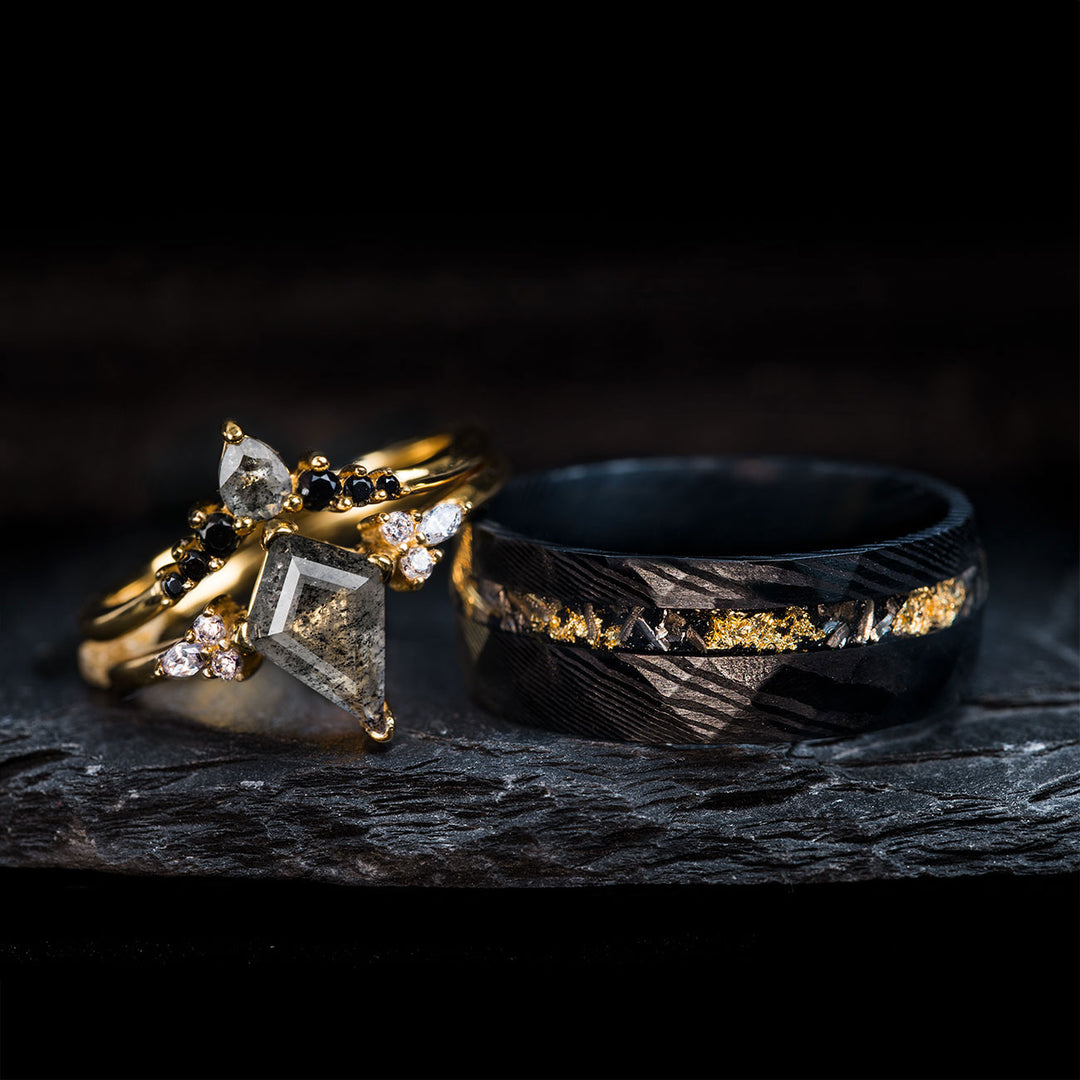Instead of the usual ring, you chose one with a billion-year history. A meteorite wedding band is cosmic history on your hand. After traveling through space, that old iron has one big weakness on Earth: moisture. Protecting your piece of the stars is straightforward, and we'll show you exactly how.

Why a Meteorite Ring Can Rust
Meteorite rings are old pieces of space rock that are often popular as unique wedding bands. A mix of iron and nickel is often used to make them. This makeup makes them unique, but it also brings a challenge from this world.
Meteorite ring rust happens because of the iron in them. Most meteorite wedding bands are made from ron-rich meteorites. When iron is mixed with oxygen and water, a chemical process happens that is known as oxidation. This turns iron into iron oxide, which we see as rust. To put it simply, water is what speeds up this natural process.
If you take the right steps, you can handle this normal process. A little care will keep your ring looking brand new for a long time.
Your Daily Plan to Prevent Meteorite Ring Rust
Protecting your meteorite ring starts with simple, consistent actions. These daily habits are key to keeping your unique wedding bands in pristine condition by preventing the conditions that lead to rust.
Keep Your Ring Dry
This is the most critical rule for all meteorite jewelry.
- Avoid Wet Environments: Always remove your meteorite men's wedding band or any meteorite ring before washing hands, showering, swimming (especially in chlorinated pools or saltwater), or doing dishes.
- Wipe Away Sweat: If you're exercising intensely, consider removing your ring. Sweat is salty and acidic, creating a prime environment for oxidation.
- Immediate Drying: If your ring gets wet, dry it immediately and thoroughly with a soft, clean cloth. Don't let it air dry, as this leaves moisture to linger.
Apply a Protective Barrier
This proactive approach helps create a moisture barrier.
- Daily Wipe-Down: At the end of each day, wipe your ring with a clean, dry, soft cloth. This removes skin oils, lotions, and any trace moisture.
- Weekly/Bi-Weekly Protection: Regularly apply a protective coating.
- Products to Use: High-quality gun oil, mineral oil, or a specialized micro-crystalline wax (like Renaissance Wax) are excellent.
- Application: Apply a tiny amount to the ring's surface. Let it sit for a few minutes. Then, buff it off vigorously with a clean, lint-free cloth. This creates a thin, invisible, water-repellent shield that significantly reduces the risk of meteorite ring rust.
This simple routine is the best defense. Consistency is the secret to a rust-free ring.
Learn Common Dangers for a Meteorite Wedding Band
Just as important as your care routine is knowing what not to do. These actions can damage your meteorite wedding band or strip away its natural defenses.
| Danger | Why to Avoid It |
| Harsh Chemicals | Bleach, household cleaners, chlorine, and even many hand sanitizers can strip away protective coatings or oils. They also accelerate corrosive processes, making your meteorite ring vulnerable. |
| Saltwater | This is perhaps the worst offender. The combination of salt and water creates a highly corrosive environment that can rapidly lead to severe meteorite ring rust. |
| Abrasive Cleaners | Never use toothpaste, baking soda (as a scrub), or abrasive polishing cloths. These can scratch the unique Widmanstätten pattern on your ring and damage its delicate surface. |
| Ultrasonic Cleaners | These devices use intense vibrations that can force water or cleaning solutions into microscopic cracks within the meteorite, potentially causing internal rust or weakening the material. |
Following these guidelines helps your wedding bands remain beautiful and structurally sound. The unique texture of your meteorite men's wedding band deserves gentle care.
Choose Meteorite Ring with Built-in Protection
While direct care is important, some wedding bands with meteorite inclusions come with built-in features for extra protection.
Liners
Many high-quality meteorite wedding band designs have an inner sleeve made from a material like gold, titanium, ceramic, or carbon fiber.
- Skin Protection: This liner creates a barrier between the iron-nickel alloy and your skin, preventing a "green finger" reaction.
- Internal Ring Protection: The liner also protects the inside of your ring from your skin's natural oils and sweat. This prevents internal corrosion, which is a common, unseen starting point for rust.
Plating
Some meteorite rings are electroplated with a thin layer of a non-corrosive metal, like rhodium or gold.
- Pros of Plating: This creates an excellent, almost rust-proof barrier. It’s effective for preventing meteorite ring rust.
- Cons of Plating: Plating is not permanent. It will wear off over time and needs to be re-applied by a jeweler. This adds cost and slightly alters the raw, natural look of the meteorite.
These features offer great long-term solutions. Consider them when choosing your ring if low maintenance is a priority.

How to Handle Rust on Your Meteorite Ring
A small rust spot still could show up even if you take care of it. Don't worry; it's usually easy to deal with if you catch it early.
Treat Minor Rust Spots
Look for small, orange-brown specks. Early detection makes removal easy.
- The Wooden Toothpick Method: For small, superficial spots, gently use a wooden toothpick to carefully flake off the rust. Wood is soft enough not to scratch.
- Gentle Baking Soda Paste: Mix a tiny bit of baking soda with water to form a gentle paste. Dab this paste only on the rust spot and use a soft-bristled toothbrush to very lightly scrub the area. This can help lift the rust.
After-Care: Re-Protecting Your Ring
Once the rust is gone, you must re-establish the ring’s protective state.
- Clean and Dry: Immediately clean the ring with 99% isopropyl alcohol. This displaces any remaining water. Then, dry it completely. A hairdryer on a low, cool setting works well.
- Re-apply Protection: As soon as the ring is dry, re-apply your protective oil or wax. This step is vital to prevent rust from returning.
See a Professional Jeweler
If the rust is spread out, has caused pitting, or won't come off with gentle methods, you should take the jewelry to a professional jeweler. Their skills and tools allow them to safely remove the rust, refinish the ring, and etch the Widmanstätten pattern again without any harm.
It's important to deal with rust promptly. These steps will bring back the beauty and strength of your ring.

Keep Your Cosmic Ring Looking Its Best
Your meteorite wedding band is a unique piece of space history that represents your special promise to be together forever. To keep it safe, all you need to do is some normal maintenance. If you take these steps to clean and care for a meteorite ring, you can be sure that this beautiful piece of space history will last a lifetime.
FAQs
Q1: Can I wear my meteorite wedding band all the time?
To best protect a meteorite wedding band, it is highly recommended to remove it during activities involving water, harsh chemicals, or heavy physical exertion. While these rings are durable, their iron content makes them susceptible to rust when exposed to moisture and corrosive substances for prolonged periods. Consistent removal during risky activities significantly extends the ring's pristine condition.
Q2: How often should I oil my meteorite ring?
The frequency of oiling depends on individual wear and environmental factors. For most wearers, applying a protective oil or wax weekly or bi-weekly is sufficient. If the ring is frequently exposed to humid conditions, or if a person's skin chemistry tends to be more acidic, a more frequent application (e.g., every few days) might be beneficial to maintain the protective barrier against moisture and prevent meteorite ring rust.
Q3: My meteorite ring has a green mark on my finger. What does that mean?
A green mark on the finger, sometimes called a "green finger," indicates a reaction between the metal alloys in the ring (specifically, the copper content often found in iron meteorites) and the skin's acidity, moisture, or certain lotions/chemicals. It's harmless but can be annoying. This is often prevented by rings with internal liners. If your ring lacks a liner, keeping it very dry and regularly applying a protective wax can help create a barrier.









